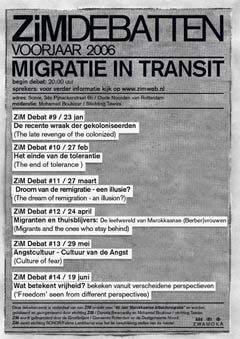ZiM Debate #15
|
 |
|
 ZiM Debate #15 ZiM Debate #15
[ Monday, 26 June 2006 ]
what means freedom? seen from different perspectives
Start: 19.30
Begin Debate: 20.00
Location: Zwaanshals 474/ Oude Noorden in Rotterdam
Directions: tram 8 (direction Oostplein) or 4 (direction Molenlaan) from Centraal Station exit Bergweg/hoek Gerald Scholtenstraat
Speakers: Christine Schöffler & Peter Blakeney (foreign agents WHY ), Thomas Körtvélyessy (choreographer, RealDance Company/Rotterdam), Samuli Schielke (antropologist, University of Mainz)
Moderation: Mohamed Boukiour / Stichting Tawiza
Over the last years there have been many debates about freedom, both on a national as well as on an international level. The question arises how freedom was formerly filled in in politics, cultural as well as legal matters. Nowadays freedom finds itself opposite to safety, as in the debates around terror and the fight against terror. In other conflicts freedom is put against respect. In the Netherlands there is for example a constant collision between freedom of speech and respect for religions. How can the one be guaranteed without limiting other values? Is freedom of speech eventually the freedom to offend, as understood by Theo van Gogh? Or does freedom has to guarantee respect for religion?
Isn't there the belief that the Western liberal understanding of freedom is a universal one? And how much is it dictating what one is or isn't allowed to want and believe in? How free are we really to do what we want? But are we really free to want everything? The liberal idea of freedom includes strong, not always outspoken normative expectations: if you want to develop your own individual life, this is excepted, thus free. If someone engages in the collective and thus sacrifices his/her individuality, this is automatically seen as done under pressure and force. Why do we think that "hoofddoek" is a constraint on freedom and bikini stands for freedom? How far are discourses around freedom really about freedom, and how much isn't the term freedom regularly abused as legitimation for other goals, as respect, security and emancipation...?
If we agree that freedom can't be an absolute term, then we have to ask ourselves, what freedom means to different people. What did freedom mean in different historical periods? What was it about, if a farmer in the Middle ages was a free man or a thrall?
What means freedom in different cultures and social contexts? What kind of understanding of freedom has a woman from a third World country? And, depending from where she will come, we will find a big variety of how much importance she will give to something so valuable to us here. Is freedom free for everyone, or how much is it a privilege? Is freedom the same and given the same importance by somebody rich or somebody poor?
And if we talk about freedom, don't we have to talk about how far free spaces still exist in our society, e.g. in the arts or in public space?

 |
|
|
|

|



